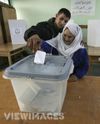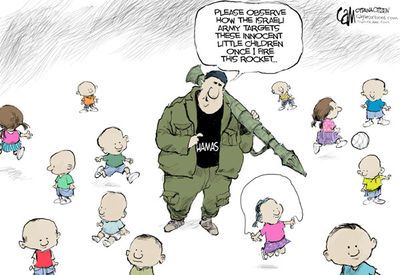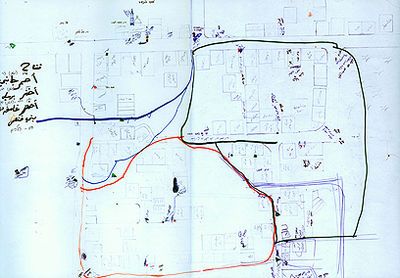Online after fighting a rear-guard action in my inbox. Here's another plug for our free Send a Soldier a Smile campaign, sponsored by Gili's Goodies and HonestReporting.
7:20 p.m. Alright, just one more post before shutting off the computer. Cam Cardow's worth it. I call this phenomenon Collateral Damage Waiting to Happen.
7:09 p.m. Knocking off. Back online on Sunday.
7:03 p.m. The IDF displayed to reporters a Hamas map it captured. The Jerusalem Post explains its significance:
Halamish said that the map showed how Hamas does not hesitate to use civilian infrastructure for its terrorist activity. On the map, a brown dot is marked next to a mosque representing a nearby sniper position.
"This is a civilian area and you can see on the map how Hamas booby-trapped the entrance to homes in order to hit the IDF," Halamish said. In another case, a large explosive device was marked on the map next to a gas station. Had it been detonated it would have likely destroyed the gas station as well, killing and wounding civilians who live in the area.
YNet News adds:
The map consists of precise drawings of all homes in the neighborhood as well as a color-coded key drawn in the top left-hand corner, which describes the type of explosive device planted at each site.
6:54 p.m. Just finished thinning out the herd of inbox emails down to 93.
6:15 p.m. Lindy McDowell decodes Hamas better than Paul Reynolds. The Irish journalist is certainly qualified to comment on occasional Hamas-IRA comparisons. On the subject of why terror groups are great at P.R. she writes::
Because people who don’t ask a lot of hard questions allow themselves to be taken in by them. It happened here. And it is happening now in the Middle East. We used to talk in these parts about visiting commentators being seduced by the whiff of cordite. Never mind that the ‘freedom fighters’ exuding gun smoke and hype were murdering fascists whose main victims were their own community.
6:06 p.m. Irish eyes aren't smiling.
6:04 p.m. Niv Horesh, an Israeli lecturer in Australia has choice words for Hamas's apologists in academia and the media.
5:52 p.m. Back from a break. Via Daled Amos, some of the rockets Hamas is firing were made in China. Silly me, I thought they were homemade.
4:55 p.m. Newsweek notes the real reason Fatah wants international troops in Gaza:
Such a move could pave the way for Fatah security forces to return to power some months down the road, the thinking goes, when they would look less like Israeli stooges.
 4:17 p.m. Dubai-based wonk mocks of the argument advanced by Hamas's apologists that the terror group deserves legitimacy for having been democratically elected. Sultan Al Qassemi writes:
4:17 p.m. Dubai-based wonk mocks of the argument advanced by Hamas's apologists that the terror group deserves legitimacy for having been democratically elected. Sultan Al Qassemi writes:
Regardless of the outcome of the barbaric Israeli Operation Cast Lead, one thing is certain; it is high time for Hamas to step down as the keeper of Gaza. This is where people will object and remind us that they were democratically elected. My answer to that is: Yes, but they are incompetent.
Most of us in the Middle East still believe that incompetence is a trait exclusive to dictators such as Muammer Gaddafi, Saddam Hussein and Jamal Abdul Nasser. However modern history has proven that democracy and incompetent governance aren’t mutually exclusive.
4:03 p.m. Spengler says:
To insist that Israel desist entirely from military activities that have a high probability of causing civilian casualties is doubly hypocritical. That would demand, in effect, that Israel value the lives of Palestinian civilians more than those of its own civilians, who are subject to rocket bombardment. That is something no state in the world can do, and it is silly to ask it. Israel has less reason than any other on Earth to heed such a demand. Never has the state of Israel been offered mercy by its enemies, nor has it any reason to expect it.
3:48 p.m. The LA Times surveyed Israeli media coverage of the fighting, understandably finding it isn't being reported the same as in the West.
As you read the piece, you'll see that the Israeli media is A) treating the fighting as a local story (imagine that), B) more responsible balancing carnage and context, and C) probably learned some lessons from the Lebanon war too.
3:29 p.m. Feeling blue after seeing depressing commentaries from Nick Kristof, Roger Cohen, Rashid Khalidi and Gideon Lichfield in today's NY Times op-ed section?
Restore your optimism with a dose of (yesterday's) Wall St. Journal and call me in the morning. This prescription also applies to anyone who saw today's Boston Globe (coincidentally or not, owned by the NY Times).
3:22 p.m. Do my eyes deceive me? The Washington Post opened its eyes to Hamas human shield tactics:
Rather than stand and fight against the Middle East's strongest army, the Islamist movement opted for a tactical withdrawal, with its fighters melting away into the strip's sprawling cities and refugee camps, according to Gaza residents and Israeli military analysts and officers.
Now, Hamas appears to be daring the Israeli troops to follow.
"They're hitting here and there with antitank missiles and mortars. Overall, though, they're not confronting the Israeli presence in Gaza," said retired Gen. Amnon Lipkin-Shahak, former chief of staff of the Israel Defense Forces. "They're challenging the Israeli military to enter the built-up areas." . . . .
Israel accuses Hamas of deliberately attacking from populated areas to drive up civilian casualty figures and stoke anger toward Israel in the Muslim world. But Hamas says it has little choice. There are no military bases in Gaza from which to fight, and the movement's members do not live apart from the rest of the population.
"They don't see themselves as being separate from the Palestinian people. They say, 'We're fighting among our people for our people's freedom,' " said Nassar Ibrahim, a Palestinian journalist based in Bethlehem who does not belong to Hamas.
3:13 p.m. Jimmy Carter proves he hasn't decoded Hamas.
 3:02 p.m. Having explained Israel's P.R. a few days ago, BBC Paul Reynolds today decodes Hamas P.R. words:
3:02 p.m. Having explained Israel's P.R. a few days ago, BBC Paul Reynolds today decodes Hamas P.R. words:
And more generally, the word [occupier] means that Israel occupies all the land of Palestine. This, Hamas defines by the boundaries of the territory mandated by the League of Nations to Britain after World War I, minus the east bank of the Jordan that Britain sliced off to give to the Jordanian royal family and which is now Jordan.
So when Hamas talks about resisting the "occupier", it is not just talking about resistance in Gaza.
Its occasional references to a long-term "truce" also must be understood. For Hamas, this does not mean a proper peace agreement with Israel. It means a cessation of violence, which could perhaps last for years, but under which it holds its options open.
And when Hamas says it is ready to accept a Palestinian state within the borders as they existed before the war in 1967, it does not follow that it would accept those borders as the last word. It hopes to re-establish Palestine as it once was.
So there you have it: doubletalking terrorist spokesmen "decoded" by the BBC.
2:41 p.m. My heart goes out to the family of Mahmoud Mashrari (spelling?), a young boy killed in an airstrike. But his brother, Ashraf, a cameraman, films scenes at the hospital, home grieving and the funeral, like reality TV.
Is this a reflection of Palestinian stringers, the titillating nature of reality TV, or something else?
 2:24 p.m. In an editorial about the Gaza fighting, Greek publisher George Karatzaferis calls Jews "Christ killers." Karatzaferis has previously claimed that no Jews died in the WTC.
2:24 p.m. In an editorial about the Gaza fighting, Greek publisher George Karatzaferis calls Jews "Christ killers." Karatzaferis has previously claimed that no Jews died in the WTC.
2:12 p.m. Heh. Now that Stephen Walt's blogging, can the professor claim anyone's stifling his free speech?
1:56 p.m. AP correspondent Ibrahim Barzak's home was destroyed in an airstrike.
Three days after Israel began its airstrikes against Hamas militants on Dec. 27, my apartment building was shaken by bombs aimed at a nearby Hamas-run government compound . . .
There are other pictures that haunt me. The Israeli army issued a video of the bombing of the Hamas-run government compound, which it posted on YouTube. In it, I also can see my home being destroyed, and I watch it obsessively.
1:42 p.m. When the IDF's on the phone warning you to leave the building because its about to be attacked, the sensible thing to do is to A) flee or B) invite your friends to come over for a human shield party.
Israel Matzav finds that Palestinians are choosing the latter. And they don't invite Daniel Pepper or Hafez al-Barghouti.
 1:27 p.m. Months after kids voted to cut off his hands, Assud the Rabbit was killed by the IDF.
1:27 p.m. Months after kids voted to cut off his hands, Assud the Rabbit was killed by the IDF.
1:17 p.m. After running a graphic front page photo yesterday, The Scotsman questions itself. Spoiler alert: Running the photo was okay, splashing it on the front page was not.
Difficult to comment on since the photo isn't featured on the web page and there isn't enough info to track it down.
1:09 p.m. With conflicts in Uganda and Sri Lanka creating more bloodshed than Gaza, Michael Medved (via Solomonia) wonders why the MSM gives more attention to Palestinian victimhood:
Why should the suffering and martyrdom of these African villagers count for less than the simultaneous, vastly more publicized misfortunes of Palestinians in Gaza?
What gives Palestinian victims their special status—a standing that brings with it a wildly disproportionate share of the world's concern and attention?
Medved offers several reasons, so read the whole thing.
12:49 p.m. Martin Fletcher misses the good 'ol days of occupied Gaza.
Israelis happily went shopping in the Gaza market and ate cheap meals at fish restaurants on the Gaza beach, while Gazans drove to Tel Aviv to work and to play. Fear was rare then and friendships were common . . . .
When Israel occupied Gaza in 1967, the relationship between Israelis and Gazans became one of occupier and occupied. But as far as daily life was concerned, the relationship was more one of amiable neighbors, even though Gaza was clearly the poor cousin.
12:41 p.m. These British cartoons, and commentaries, are ugly.
12:28 p.m. Not-so-pleasant surprise from the poison pen of Peter Brookes at the Times of London:
When will Fleet Street wake up to the way Hamas deliberately operates in urban areas?
12:24 p.m. A pleasant surprise: a National Review commentary plugs the work of HonestReporting, other media watchdogs and bloggers.
12:16 p.m. The Jerusalem Post staff-ed slams UK coverage of the UN school shelled by Israel after a rocket crew launched mortars from close by.




